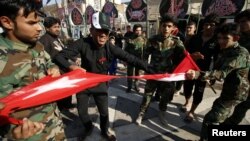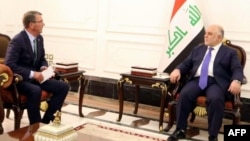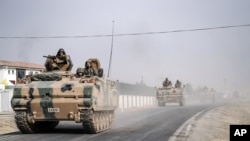U.S. officials are scrambling to contain flaring tensions between Ankara and Baghdad after Turkish officials announced their troops Sunday shelled Islamic State positions near the Iraqi city of Mosul - an artillery barrage, the Turks say, requested by Kurdish peshmerga commanders.
A dispute between Baghdad and Ankara over Turkey’s insistence on participating in the retaking of Mosul has simmered for months, prompting Western alarm over yet another complication in a highly complex military campaign involving an unruly alliance of many rival forces to oust IS militants from Iraq’s second largest city.
In the run-up to the Mosul offensive, launched a week ago, U.S. officials struggled to resolve disputes between anti-IS allies - Iraqis, Shi’ite militias, the Kurdistan Regional Government’s forces and local Sunni tribesmen. One of the thorniest disagreements has revolved around Turkey’s demand that it play a role in ousting the jihadists from Mosul and its insistence on having a “seat at the table” when it comes to how the city is governed after the militants’ ouster.
Last week, a former U.S. envoy to Iraq, Zalmay Khalilzad, warned of a possible clash of arms between Iraq and Turkey, writing in a U.S. foreign policy magazine of there being a “danger of a war within a war that could damage the prospects for retaking and stabilizing Mosul.”
Agreement ‘in principle’
On Friday, U.S. officials thought they had found a solution to the smoldering disagreement between Ankara and Baghdad, following a three-day trip to the region by U.S. Defense Secretary Ash Carter. He said he had brokered the outlines of a deal between the Turks and Iraqis regarding the involvement of Turkish forces in the military offensive. Although he acknowledged the details still needed to be finalized.
“I think there's agreement there in principle," Carter told reporters. "Now we're down to the practicalities of that... and that's what we're working through.”
U.S. officials acknowledged Monday to VOA that the bid to contain the Ankara-Baghdad flare-up has been made much more difficult by Sunday’s shelling, which was announced by Binali Yildirim, the Turkish prime minister. He said Turkish troops deployed outside Mosul had provided support for peshmerga forces "with artillery, tanks and howitzers."
On Monday, Baghdad was further infuriated when Turkey’s foreign minister, Mevlut Cavusoglu, told reporters that four Turkish F-16 fighter jets were on standby to provide air support for the peshmerga.
The dispute between Ankara's Sunni leadership and Baghdad's Shi'ite government was first sparked in December 2015 when Turkey deployed more than a thousand troops to a base near the town of Bashiqa, 24 kilometers from Mosul, to train a 3,000-men-strong Sunni militia led by a former governor of Mosul, Atheel al-Nujaifi, who is at odds with Baghdad.
Turkish officials see the Sunni militia being trained as a counterweight to Iran-influenced Shi’ite militias Baghdad has depended on in the fight against IS militants.
Turkish officials insist their troops are only in northern Iraq with one aim in mind: to prevent Mosul, a traditional Sunni Arab city, from coming under the sway of Shi’ite militias once the city has been retaken from the Islamic State terror group. President Recep Tayyip Erdogan has made a series of incendiary speeches in recent weeks emphasizing that he won't stand by and see Mosul controlled by Shi’ites and has adamantly rebuffed Baghdad’s demand to withdraw Turkish forces from northern Iraq.
In one television interview he said: “But there is a major question, who will then control the city? Of course, Sunni Arabs, Sunni Turkmen and Sunni Kurds.”
Turkish presence
Baghdad considers Turkey’s presence on its soil a violation of sovereignty and has appealed to the United Nations to compel Turkey to withdraw from Iraq. Haider al-Abadi, Iraq's prime minister, has warned that the standoff risks "triggering a regional war.”
Ankara’s ambitions in northern Iraq seem to be much greater than just ensuring Mosul remains a Sunni city, some analysts say. What is driving Ankara is fear of growing Iranian influence on Iraq - an influence it wants to reduce by encouraging the Kurdistan Regional Government (KRG) to break away from Iraq and form an independent Kurdish state.
“After its liberation, Mosul will become the theater – if it isn’t already – for the Turkish-Iranian regional competition for influence,” says Merve Tahiroglu, an analyst with the Foundation for the Defense of Democracies, a Washington-based think tank.
“And here is where the KRG comes in: Turkey has continuously used the KRG to protect its interests in Iraq at times of trouble with Baghdad, including the justification for the military camp in Bashiqa, and has used the KRG as leverage,” says Tahiroglu.
The relationship between the KRG and Ankara has grown in leaps and bounds as Iraqi Kurds have become increasingly economically dependent on the Turks. The resumption of Ankara’s war with Turkey’s outlawed Kurdistan Workers' Party, or PKK, last year tested Turkish-KRG ties. But the government of Masoud Barzani in Irbil shares Ankara’s anxieties about the ambitions of the PKK in Syria and Iraq, says Tahiroglu.



